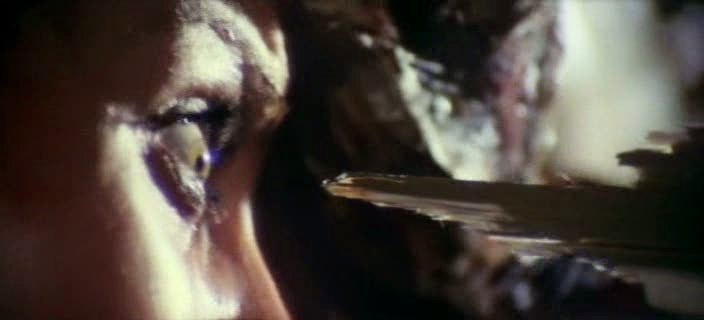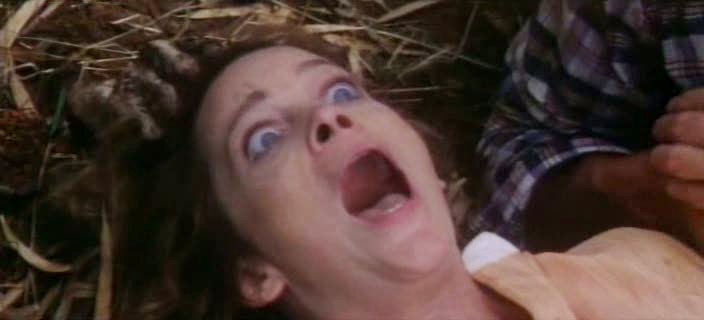aka Zombi 2; Zombie Flesh Eaters

Even the title of Italian horror maestro Lucio Fulci’s most famous, and infamous, film is subject to the vagaries of ’70s European exploitation cinema trends. It was released as Zombi 2 in Italy, but

The impact of this film has softened quite a bit with age: horror cinema’s fondness for the gruesome has almost accidentally outstripped this sort of old-school offal-and-latex style of shock. The unabashed directness of the copious gore and soft-core nudity doesn’t so much disappoint today as seem merely like a more extreme version of the familiar. Zombie’s set-pieces are nonetheless justly famous in their absurd bravura, from the fight between a shark and a zombie, to a subsequent cinematic highlight which demands being described in excitedly adolescent terms: “You know, man, she gets the bit of wood right in her eye, dude!” The atmosphere is still indelible, seedy, intense, and laden with excellent cadaverous effects. Lucio Fulci’s name is still a potent one these days, or perhaps even more potent, for the contemporary search for obscure genre masters has gained him some dedicated fans and many haters. His cinema here is all about spare, direct force, from the opening shot of a pistol muzzle turned on the camera a la The Great Train Robbery, to the final, inadvertently amusing shot of zombies stumbling across the Brooklyn Bridge Third World , is barely coherent and only incidentally explored. Nonetheless, there’s an engaging imagistic parallel between the start of Zombie, which also suggests the drifting ship of Nosferatu (1922), and Michael Wadleigh’s explicitly political Wolfen (1981) in placing primal dread directly on the doorstep of western capitalism’s Mecca, lower Manhattan, as a seemingly unmanned yacht floats into New York Harbour.

When two harbour patrol cops board the vessel, one of them has his throat torn out by a rotund, apparently rotting but still mobile man who lurks in a cabin. The other cop shoots the assailant, who falls overboard into the East River , and the boat is brought in. The dead cop is checked over by medical examiners, whilst the daughter of the boat’s owner, Anne Bowles (Tisa Farrow, Mia’s sister) is called to the docks by police. There’s no sign of her father or the rest of the boat’s crew on board. A journalist, Peter West (Ian McCollough), the English nephew of the new owner of a New York newspaper, sneaks on board the boat at night, as does Anne, in search of the ship’s hidden log, which might give a clue of what happened to the missing hands and their master. After a goofy bit in which they pretend to be lovers looking for a place to screw, to fool a guarding cop who catches them on the boat, they decide to team up and travel to the Antilles , where Anne’s father often visited. There, they team up with an adventuring young couple, Brian Hull (Al Cliver) and Susan Barrett (Auretta Gay), who agree to help them find the island of Matou

Zombie’s actual plot is minimal, and the script barely concerned with the niceties of setting up either thematic complexity or storytelling breadth of scope. The main priority is to create a little vision of hell enfolding some perfectly average people. Vital pieces of information are quickly relayed through flashbacks and scant lines of dialogue. To a certain extent this lean, no-nonsense quality of the film is an asset, because if Elisa Briganti’s script tried to offer those things they would probably have proved dull and caricatured. Even before Anne, Peter, Brian and Susan reach Matou, they encounter a zombie, in a truly bizarre sequence in which Susan, deciding to take time out for some diving, is stalked by a shark and then by one of the undead, which, having finished up in the ocean, is calmly strutting on the sea floor seeking prey. The shark and zombie finish up brawling, zombie tearing off a chunk of the shark’s underbelly and eating it, shark finally claiming one of the zombie’s arms. It’s clearly a nod to Jaws (1975), another film Italian genre filmmakers were temporarily obsessed with cashing in on, and yet it’s also a surprisingly potent vision of mutual predatory behaviour, accomplished with eye-popping risk to life and limb on the actors’ parts, and an inspired riff on the idea of the zombie as a creature beholden to no limits of the natural world.

Speaking of eye-popping, that’s what happens a couple of scenes later when a lurking zombie attacks Paola in her bathroom, smashing through a door and grabbing her hair, and pulling her with relentless slowness out through the partition, but not before a jagged piece of slatting jams itself directly in her iris. Such a scene is the stuff of raw phobia, extremely well-done in terms of make-up and staging. Fulci telegraphs the scene earlier, when he zooms in slowly on Karlatos’s vivid green eyes, after she’s threatened to tell everyone back in the big world about what she’s seen her husband up to. If thine eye offend thee, indeed. Later, the always-lurking correlation of sex and death reaches a particularly pathological apogee when, having crashed their jeep and being trapped in the middle of zombie-infested Matou, the four heroes take refuge in an overgrown Conquistador cemetery. When Peter kisses Anne in a moment’s grace from cares, gnarled, rotten hands of corpses reach out of the earth and grasp at the couple. Susan, whose carefree nature-child fondness for scuba diving whilst bare-breasted has already come close to peril, now has her throat torn out by one of the revived Conquistadors. The imagery is rancid in its simple strength, both visually, the corpses dangling maggots and worms, flesh hanging loose on the bone even as they lurch away to devour the living, and thematically, as the buried remnants of white conquest of the Americas heave themselves out of the earth at the behest of the tom-tom beating natives, and set out to join an insidious horde that will eat the modern nations from the inside out.

On this level of sheer anarchic fantasy, Zombie has a purified force that is all the more engaging because of the deadly seriousness Fulci takes it with. Practically no humour, other than the inherently absurdist, incidental kind in watching a shark battle a zombie, is allowed to despoil the film’s sense of purpose. It’s a long way, for instance, from the laugh-yourself-sick style of Peter Jackson’s Brain Dead (1992). With Cronenberg’s new flesh still a little in the future, we’re here to watch the old flesh be torn to shreds, it seems Fulci is saying, so let’s get down to it. Fulci’s suspense sequences are basic; almost as soon as they begin, moments like Paola’s stalking and killing rush to the money shots and are then done with. The clear yet cheerless, anti-beautifying, muddily coloured cinematography by Sergio Salvati, and Fulci’s calm, unaffected, fluidly edited style, emphasises the brutally direct narrative and the gritty, unromantic age it perceives the late ‘70s as. The music, by Fabio Frizzi and Giorgio Tuzzi, has that kind of spacey, rhythmically creepy edge common to a lot of synthesiser scores from the era. Like Michael Ritchie’s The Island from the following year, and James Cameron’s Piranha II: The Spawning (1982), the film might described as a member of a small genre of “island paradise horror” where adventures in the sunny Caribbean get real grim real quick, and the settled order of the tourist-friendly world is shattered.

And yet the whole thing could have been far better if fleshed out more, so to speak, and achieved minor classic status, rather than the diverting spectacle of atrocity it remains. Fulci goes through the paces of reproducing Romero’s cynical figurations, like loved ones returning to assault their living fellows, and noting the inability of people to adapt to changing realities quickly enough, but they’re really throwaway gags in Fulci’s hands. Stronger writing and a deeper exploration of the way Menard’s scientific meddling has exacerbated the problem would have helped. A less stereotyped, more detailed employment of the voodoo angle also would also have helped Zombie escape a common fault of a lot of the Italian-produced horror films of the ’70s and ’80s: attempting to make a progressive critique of western patronisation and exploitation of other populaces, instead it’s really the same old “it’s the voodoo” jazz, exacerbated by brief appearances by black characters mumbling fearfully about juju men. The natives who seem to be causing the zombie outbreak are only suggested by the constant tremor of their drums deep in Matou’s forest, rendered as alien and threatening merely, therefore, for being non-European. The filmmaking wavers, mostly achieving a quite admirably solid, corporeally palpable sense of danger and place, at its best in the early scenes coolly observing the progress of the abandoned boat, its rigging yawing in the wind, litter on the deck rolling about, with a deceptive calm worthy of that John Carpenter wielded in The Fog (1980). But the film is also riddled with sloppy points of continuity, most notably towards the end when the heroes throw a half-dozen Molotov cocktails, and Fulci cuts each time to the same shot of the incendiary landing and exploding. Fulci’s work isn’t of the type one can accuse of artistry, except for the most functional kind.

Still, the sequences in which the heroes fortify themselves within Menard’s clinic, located in a mission church, and succumb with surprising speed to the infected coming from outside and already within, are admirable in their sheer relentlessness and bloody enthusiasm. The newly-dead join the enemy before anyone has time to think about them. Neglecting to shoot the zombies in the head, no matter how many times they’re shot elsewhere, sees them spring up again as deadly as ever. The whole project gains the sort of driving force and punchy attitude that would soon come to typify the blockbuster, all incident, little set-up. Zombie heads are shattered and blown off, undead flesh is burned and gnarled, strips of skin and muscles are torn off the hapless and the slow. The finale, which finds our heroes turning on the radio having escaped Matou only to learn the plague has gained a foothold in New York

